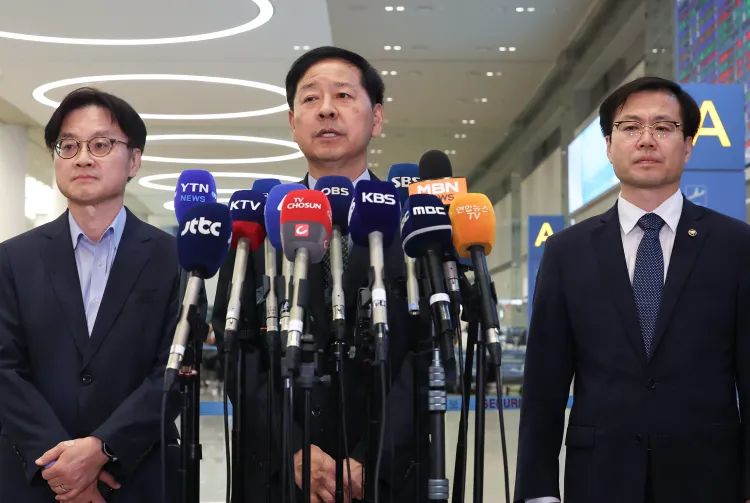Will South Korea Be a Favored Nation for US Chip Tariffs?

Synopsis
Key Takeaways
- South Korea gains most favored nation status from the U.S..
- Korean firms are exempt from 100 percent tariffs.
- Tariff rate set at 15 percent for semiconductors.
- Significant investments of $350 billion promised by Seoul.
- Collaboration between Apple and Samsung on new semiconductors.
Seoul, Aug 7 (NationPress) South Korea will be recognized as a most favored nation (MFN) by the United States regarding semiconductor exports due to a bilateral tariff agreement, as announced by the trade minister on Thursday. He emphasized that Korean companies will not face the proposed 100 percent tariffs previously mentioned by U.S. President Donald Trump.
In a radio interview with SBS, Trade Minister Yeo Han-koo stated, "If the U.S. sets the semiconductor tariff rate for MFNs at 15 percent, South Korea will also benefit from 15 percent tariffs, even if the rate escalates to 100 percent or 200 percent."
Yeo further noted, "The trade agreement entails that the U.S. administration has assured us MFN status in the semiconductor and bio sectors moving forward," as reported by Yonhap news agency.
These comments followed Trump's announcement of a forthcoming 100 percent tariff on semiconductor imports, which is anticipated to be officially declared in the weeks ahead.
When questioned about Samsung Electronics and SK Hynix, the prominent chip manufacturers in Korea, Yeo confirmed, "Yes, they will not be subjected to 100 percent tariffs."
Experts in trade and industry expect the tariff rate for chip imports from MFNs to be set at 15 percent, aligning with the recent agreement where the U.S. agreed to impose a 15 percent duty on European products.
In the arrangement with Korea, the Trump administration has not disclosed the specific tariff rate for Korean-made semiconductors but has committed to granting Seoul MFN status.
The U.S. has reduced its reciprocal tariffs on Korea to 15 percent from a proposed 25 percent, and similarly lowered the tariff rate for Korean automobiles.
In exchange, Seoul has pledged to invest $350 billion in the U.S. for collaboration in sectors such as shipbuilding, semiconductors, and batteries, while also committing to purchase $100 billion worth of American energy products.
Earlier today, Apple Inc. announced its collaboration with Samsung at its Texas foundry plant to develop next-generation semiconductors intended for iPhone devices.









